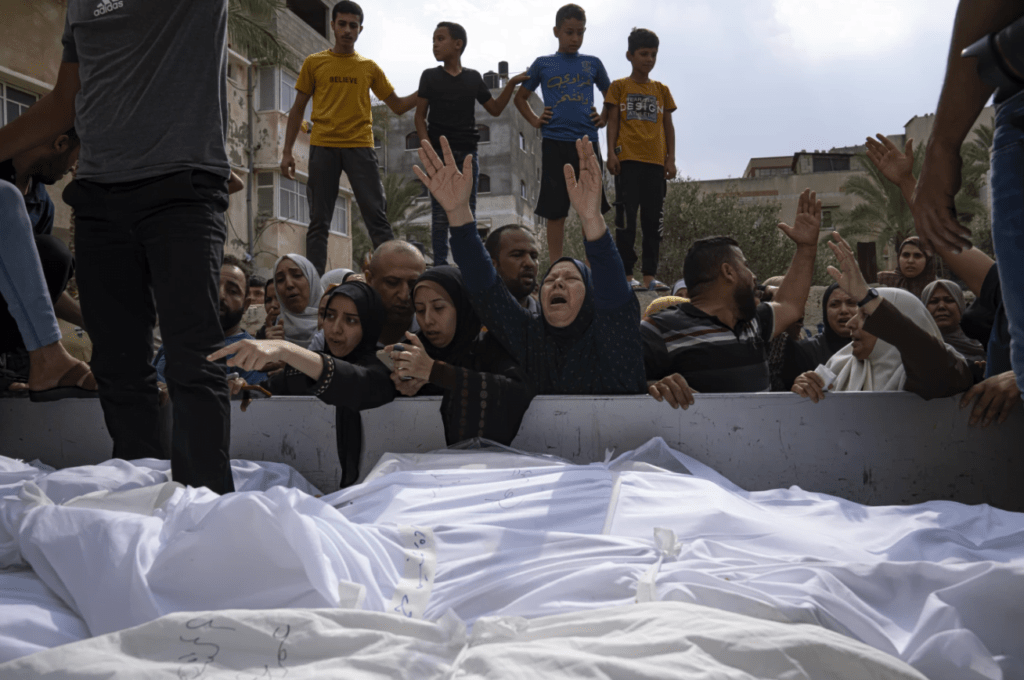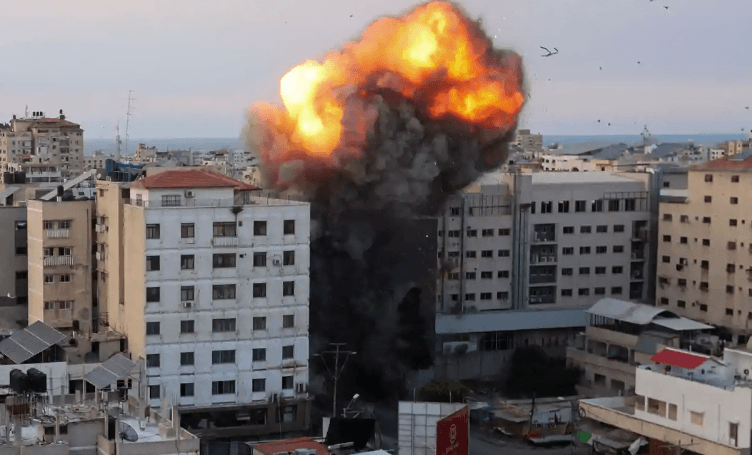Israel’s military issued a directive on Friday, ordering the evacuation of northern Gaza, a region home to 1.1 million people within 24 hours.
The order, which applies to nearly half of the territory’s population, has raised concerns of a potential ground offensive, although the Israeli military has not officially confirmed such plans. They announced their preparation on Thursday but stopped short of confirming a decision.
The U.N. spokesman, Stéphane Dujarric, described the order as “impossible” without severe humanitarian consequences, according to AP.

It comes as the Australian government announced it will facilitate the departure of citizens from Israel amidst the rising death toll in the region.
Qantas will operate repatriation flights from Tel Aviv’s Ben Gurion airport to London, and these flights will be provided free of charge to Australians who do not already have commercial departure plans. Qantas will cover the operational expenses for these flights.
The government announced that these two flights will commence on Friday, but the precise flight details are still being worked out in collaboration between the Department of Foreign Affairs and Trade (Dfat) and Qantas.
Prime Minister Anthony Albanese emphasised the necessity of government-backed flights due to the challenges many Australians are facing, including delays and cancellations with commercial flight options.
Previously, the Israeli military had conducted extensive airstrikes on the Gaza Strip, indicating readiness for a potential ground invasion. They also maintained a complete siege of the territory, leading to severe shortages of food, fuel, and medicine, as Hamas militants continued to hold around 150 hostages from a recent incursion.
U.S. Secretary of State Antony Blinken’s visit and the delivery of U.S. weaponry provided strong support for Israel’s ongoing actions in Gaza, despite concerns from international aid organizations about the worsening humanitarian crisis. Israel had blocked essential supplies and electricity, leaving Gaza’s 2.3 million residents in dire circumstances, with no access to basic necessities or aid from Egypt.
Israeli Energy Minister Israel Katz confirmed the halt of essential services and fuel deliveries until the hostages were released. The Israeli military’s Lt. Col. Richard Hecht indicated their readiness for a ground operation if political leaders commanded it.

The continuous bombardment of Gaza, involving 6,000 munitions according to the military, led to Palestinians fleeing their homes, seeking safety amid the chaos.
A strike on the Jabaliya refugee camp resulted in the collapse of a residential building, killing at least 45 people, with 23 of the casualties being under 18 years old. The strike occurred on a home where numerous relatives had sought refuge after fleeing from other areas. Additional reports indicated that another house was hit simultaneously, but the extent of the damage remained unknown. Israel’s military did not immediately respond to requests for comment.
Residents in Gaza faced growing challenges as the number of displaced individuals increased by 25% within a day, reaching 423,000 out of a population of 2.3 million. Many crowded into U.N.-run schools for shelter, where families struggled to secure enough food for even a single meal.
The lack of electricity and rationed water supply left many families in dire straits. A severe shortage of basic necessities persisted, with most bakeries unable to produce bread due to a lack of electricity.
Gaza’s sole power station ran out of fuel and ceased operations, leaving only scattered private generators for essential lighting. Hospitals, overwhelmed with wounded patients, faced dwindling supplies and had only a few days of fuel left for their operations.
International Committee of the Red Cross regional director Fabrizio Carboni warned of the grave consequences of power shortages on critical medical equipment such as newborn incubators, kidney dialysis machines, and X-ray systems.
The hospitals also faced damage from strikes, with at least 14 health facilities affected. Gaza’s biggest hospital, Shifa, reached its capacity in the morgue, leaving ambulance crews with no space to place the deceased. Gaza’s healthcare system was on the brink of collapse.
Israel’s response to the conflict included the leveling of entire neighborhoods rather than targeting individual buildings. Hecht, the military spokesperson, defended these decisions, citing intelligence regarding Hamas locations and asserting that civilians were warned before strikes.
The Israeli Prime Minister, Benjamin Netanyahu, vowed to “crush” Hamas following their attack on civilians and soldiers, which included the killing of hundreds of people, including children, in their homes and at a music festival.
Secretary of State Antony Blinken’s visit demonstrated strong U.S. support for Israel’s response to the conflict. Blinken urged Israel to take every possible precaution to avoid civilian casualties. His visit also included meetings with Palestinian President Mahmoud Abbas and Jordan’s King Abdullah II.
Israel’s military actions have been met with criticism, both internationally and domestically, as concerns grew over the surprise attack by Hamas and Israel’s response.
In a video released by civilian Hamas figures, the group defended their actions and lamented civilian deaths in Gaza. However, this video lacked the bravado of a previous recording aired by Hamas’s military wing. Hamas leader Basem Naim acknowledged the “swift collapse” of the Israeli military on Saturday, leading to civilians caught in the confrontation.
The ongoing conflict has taken a severe toll on both Israeli and Palestinian populations, with growing anger directed at the Israeli government. Israel’s public diplomacy minister resigned, marking the first sign of division within Netanyahu’s government since the conflict began.
As the situation unfolds, Israel’s military mobilizes, and Hamas stands firm in Gaza. The international community watches closely as the crisis deepens.

